

Google Fiber: We’re not (just) in Kansas anymore. Internet regulation: The underwood of net neutrality. Google Fiber: We’re not (just) in Kansas anymore. Government-to-government trade: Unbundling the nation state. CIGI and Chatham House launch Global Commission on Internet Governance, chaired by Sweden’s Carl Bildt. Davos-Klosters, Switzerland – January 22, 2014 – Carl Bildt, Sweden’s Minister of Foreign Affairs, will chair a new Global Commission on Internet Governance, launched by The Centre for International Governance Innovation (CIGI) and the Royal Institute of International Affairs (Chatham House).
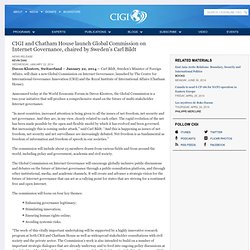
Announced today at the World Economic Forum in Davos-Klosters, the Global Commission is a two-year initiative that will produce a comprehensive stand on the future of multi-stakeholder Internet governance. “In most countries, increased attention is being given to all the issues of net freedom, net security and net governance. And they are, in my view, closely related to each other. Internet regulation: The underwood of net neutrality. Google Fiber: We’re not (just) in Kansas anymore. Government-to-government trade: Unbundling the nation state. Government-to-government trade: Unbundling the nation state. German Television does first Edward Snowden Interview (ENGLISH) Germans want greater state control of internet - The Local. DPA/The Local | 4 Dec 2013, 08:00 More than half of Germans want greater state control over websites, but about the same share are worried about surveillance of their own online activity, a survey on Tuesday revealed.
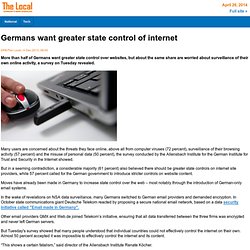
Can Germany really keep bytes within its borders? - The Local. Alex Evans | 29 Nov 2013, 10:10 Germany's biggest telecoms firms have promoted a national email network after the US National Security Agency (NSA) intercepted millions of emails via international hubs.

But how realistic are dreams of a German-only system? Alarmed by the extent to which foreign intelligence services conducted a mass online surveillance programme, German users have been jumping ship on popular foreign-based email services in their droves. Outgoing German justice minister Sabine Leutheusser-Schnarrenberger told journalists at a Berlin press conference in August: "German users have reacted to the NSA scandal by switching to German email providers…and they are demanding encryption.”
And in October former state-owned communications giant Deutsche Telekom proposed a secure national email network, based on a data security initiative called "Email made in Germany" which was launched in August. China, Russia seek greater control of Internet: U.S. U.S. vs. China, Russia in Battle for Control Over the Internet. Photograph by David Lowe The U.S. government has vowed to fight efforts by Russia and China to empower the U.N. to regulate the Internet.

Battle for control of the internet heats up. The internet doesn't just work, says Chris Disspain, CEO of auDA. File Photo: Jim Rice Opinion A US-led coalition has controlled internet policy for three decades, but moves are afoot for a new fightback arrangement in light of recent revelations of mass surveillance, writes Sandy Plunkett. Now Germany Wants Its Own Internet In NSA Spying Wake. PARIS/FRANKFURT (Reuters) - As a diplomatic row rages between the United States and Europe over spying accusations, state-backed Deutsche Telekom wants German communications companies to cooperate to shield local Internet traffic from foreign intelligence services.

Yet the nascent effort, which took on new urgency after Germany said on Wednesday that it had evidence that Chancellor Angela Merkel's mobile phone had been monitored, faces an uphill battle if it is to be more than a marketing gimmick. It would not work when Germans surf on websites hosted on servers abroad, such as social network Facebook or search engine Google, according to interviews with six telecom and internet experts. Deutsche Telekom could also have trouble getting rival broadband groups on board because they are wary of sharing network information. Censorship as Performance Art: Uzbekistan's Bizarre Wikipedia Ban - Sarah Kendzior. The country's decision to block the Uzbek-language wiki may be more about showmanship and nationalism than controlling information.
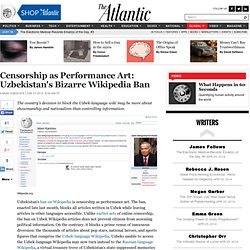
Wikipedia.org Uzbekistan's ban on Wikipedia is censorship as performance art. The ban, enacted late last month, blocks all articles written in Uzbek while leaving articles in other languages accessible. Unlike earlier acts of online censorship, the ban on Uzbek Wikipedia articles does not prevent citizens from accessing political information. Internet Censorship and the “Territorialization” of the Internet. In January 2012, the authoritarian government of Uzbekistan blocked Uzbek-language Wikipedia, making it impossible for a person with layman’s computer skills to access the Uzbek online encyclopedia from any computer located within the borders of Uzbekistan.
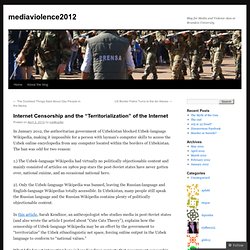
The ban was odd for two reason: 1.) The Uzbek-language Wikipedia had virtually no politically objectionable content and mainly consisted of articles on 1980s pop stars the post-Soviet states have never gotten over, national cuisine, and an occasional national hero. 2). Turkish MPs endorse Internet control law - Europe. Turkey's parliament has adopted a new Internet bill roundly criticised as an assault by Prime Minister Recep Tayyip Erdogan on freedom of expression, access to information and investigative journalism.
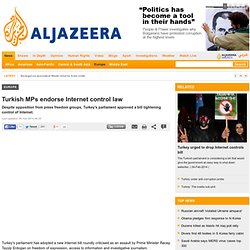
After hours of debate, the measures were adopted late on Wednesday where Erdogan's ruling Justice and Development Party (AKP) dominates with 319 of the 550 seats. The text notably permits a government agency, the Telecommunications Communications Presidency (TIB), to block access to websites without court authorisation, if they are deemed to violate privacy or with content seen as "insulting". The legislation would also force Internet providers to keep records on Web users' activities for two years and make them available to authorities when requested, without notifying the users. The Feds Lost on Net Neutrality, But Won Control of the Internet. Image: DrAfter123/Getty No matter what you think of network neutrality — for it, against it, it’s complicated, who cares — the fact that a federal court just struck down most of the FCC’s net neutrality rules is clearly cause for concern.
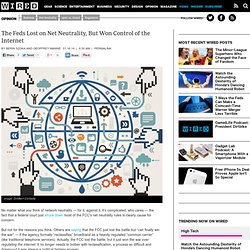
What Does It Mean for the U.S. to 'Lose Control of the Internet?' - Robinson Meyer. The NSA revelations have thrown open an Internet governance dispute that seemed resolved. What’s next? Is the U.S. losing control of the Internet? That’s how some are interpreting a statement released in October by 10 organizations central to the Internet’s operation. “With striking unanimity, the organizations that actually develop and administer Internet standards and resources initiated a break with three decades of U.S. dominance of Internet governance,” writes Milton Mueller, a professor at the Syracuse University School of Information Studies.
“A break” sounds severe—what would that mean? Spark with Nora Young. Net neutrality D.C. circuit court ruling: The battle’s been lost, but we can win the war. Photo by T.J.
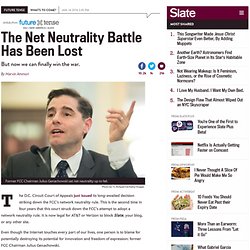
Kirkpatrick/Getty Images The D.C. Institute > A Victory for an Unfettered Internet. Cyber wrap. Montevideo Statement on the Future of Internet Cooperation. Montevideo, Uruguay – The leaders of organizations responsible for coordination of the Internet technical infrastructure globally have met in Montevideo, Uruguay, to consider current issues affecting the future of the Internet. The Internet and World Wide Web have brought major benefits in social and economic development worldwide. Both have been built and governed in the public interest through unique mechanisms for global multistakeholder Internet cooperation, which have been intrinsic to their success.
The leaders discussed the clear need to continually strengthen and evolve these mechanisms, in truly substantial ways, to be able to address emerging issues faced by stakeholders in the Internet. In this sense: They reinforced the importance of globally coherent Internet operations, and warned against Internet fragmentation at a national level. Adiel A. John Curran, CEO American Registry for Internet Numbers (ARIN) Russ Housley, Chair Internet Architecture Board (IAB) The US is losing control of the internet.
All of the major internet organisations have pledged, at a summit in Uruguay, to free themselves of the influence of the US government. The directors of ICANN, the Internet Engineering Task Force, the Internet Architecture Board, the World Wide Web Consortium, the Internet Society and all five of the regional Internet address registries have vowed to break their associations with the US government. In a statement, the group called for "accelerating the globalization of ICANN and IANA functions, towards an environment in which all stakeholders, including all governments, participate on an equal footing". News - CSEC used airport Wi-Fi to track Canadian travellers: Edward Snowden documents.
Exclusive.